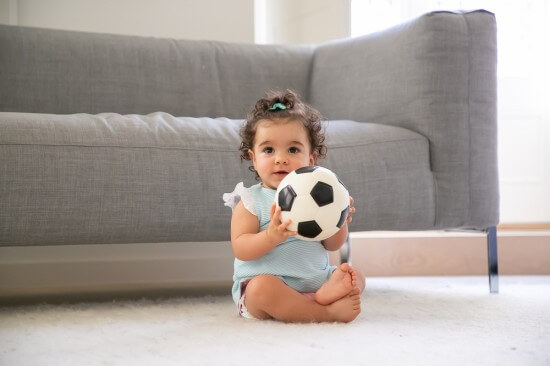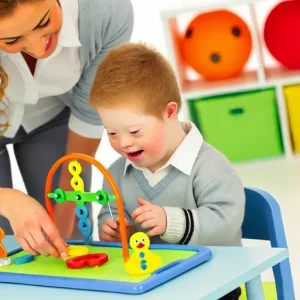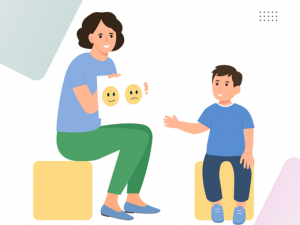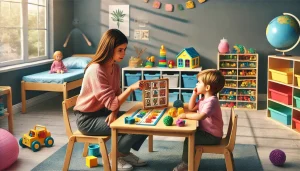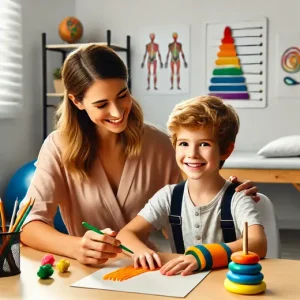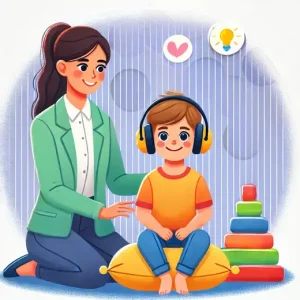When and Why a Child Needs Occupational Therapy
By Wellness Hub
Last Updated: July 8, 2024
Understanding when your child might need occupational therapy (OT) can be a turning point in ensuring their optimal development and happiness. Occupational therapy offers specialized support designed to enhance various essential skills for daily life—from fine motor skills and social interactions to sensory processing abilities. If you find yourself worrying about your child’s ability to navigate everyday challenges, this guide will illuminate how occupational therapy could be the key to unlocking their full potential. Let’s explore why and when this therapeutic intervention might be necessary, so you can make informed decisions about your child’s well-being and growth.
What is Occupational Therapy?
Occupational therapy (OT) is a type of healthcare that helps children develop the skills they need for daily life. Imagine OT as a support system that assists kids in becoming more independent and capable in their everyday activities. From getting dressed in the morning to playing with friends, OT covers a wide range of essential skills.
The goal of occupational therapy is to help children improve their fine motor skills, gross motor skills, sensory processing, social interactions, and cognitive abilities. By focusing on these areas, occupational therapists aim to enhance a child’s ability to perform tasks at home, in school, and in the community.
For example, if a child has trouble holding a pencil, an occupational therapist will work on strengthening their hand muscles and coordination. If a child finds it challenging to interact with peers, the therapist will help develop social skills and strategies to communicate effectively. Every session is tailored to meet the unique needs of the child, ensuring they receive personalized support.
Also read: Online Occupational Therapy
Signs a Child Might Need Occupational Therapy
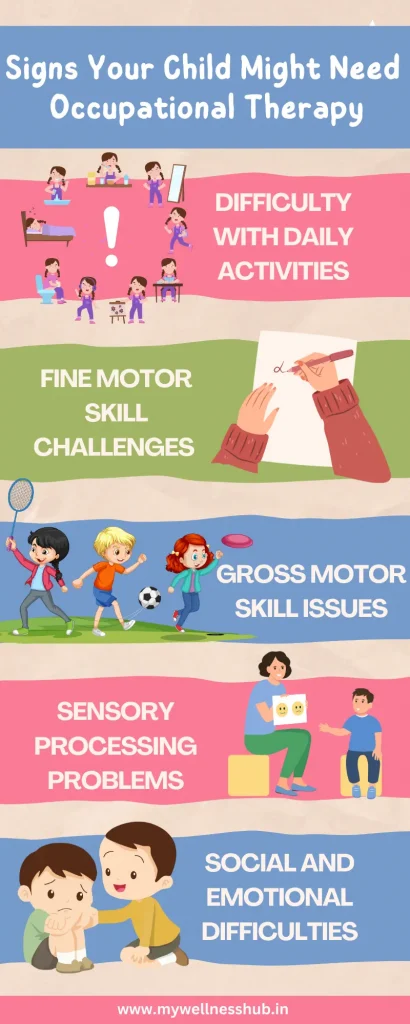
As parents, it’s natural to want the best for our children, especially when it comes to their development and daily activities. But how can you tell if your child might need occupational therapy? Here are some common signs to watch out for:
Difficulty with Daily Activities
One of the first indicators that your child might benefit from occupational therapy is if they struggle with everyday tasks. This includes activities such as:
- Dressing: If your child has trouble putting on clothes, buttoning shirts, or tying shoelaces.
- Eating: Difficulty using utensils, drinking from a cup, or managing food textures.
- Brushing Teeth: Struggling with the coordination needed for brushing teeth properly.
These activities are essential for independence, and challenges in these areas can be a sign that occupational therapy might help.
Struggles with Fine Motor Skills
Fine motor skills involve the small muscles of the hands and fingers. If your child has trouble with tasks that require these skills, it might be a sign to seek occupational therapy. Look for difficulties such as:
- Writing: Poor handwriting or trouble holding a pencil correctly.
- Using Scissors: Difficulty cutting along lines or handling scissors safely.
- Manipulating Small Objects: Struggling with puzzles, buttons, or small toys.
Fine motor skills are crucial for school performance and daily functioning, making them an important area to address.
Issues with Gross Motor Skills
Gross motor skills involve larger muscle groups and overall body coordination. If your child appears clumsy or uncoordinated, they might have issues with gross motor skills. Signs include:
- Running and Jumping: Difficulty with running, jumping, or other physical activities that require coordination.
- Balance: Trouble maintaining balance or frequently falling.
- Climbing Stairs: Struggling to go up and down stairs appropriately for their age.
These skills are important for physical health and participating in playground activities.
Social and Emotional Challenges
Occupational therapy can also help children who face social and emotional difficulties. Signs that your child might benefit include:
- Making Friends: Difficulty interacting with peers or making friends.
- Regulating Emotions: Trouble managing emotions, frequent tantrums, or difficulty calming down when upset.
- Adaptability: Struggling to adapt to new environments or changes in routine.
Detailed Areas of Need
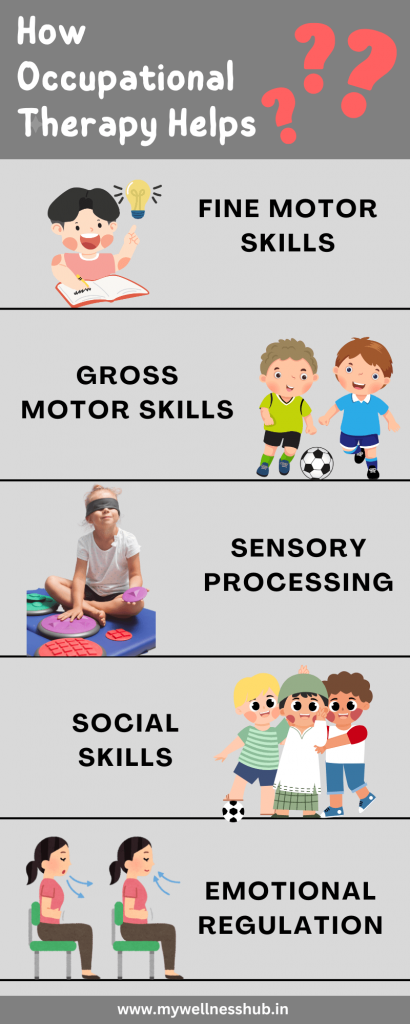
Developmental Delays
Developmental delays occur when a child does not reach developmental milestones at the expected times. These milestones include activities such as sitting, crawling, and walking. If your child is significantly behind in these areas, it may be a sign of a developmental delay. Other examples include not learning at an age-appropriate level or not developing age-appropriate play and social skills. Addressing these delays early with occupational therapy can help your child catch up and improve their overall development.
Fine Motor Skills
Fine motor skills involve the small muscles of the hands and fingers. These skills are crucial for tasks such as manipulating toys, holding a pencil, using utensils, and buttoning clothes. If your child has difficulty with these activities, it could be a sign that they need help developing fine motor skills. Struggles with fine motor skills can impact their ability to perform well in school and manage daily tasks independently.
Also Read: Enhancing Kids Writing: Key Fine Motor Skills Development
Gross Motor Skills
Gross motor skills involve larger muscle groups and overall body coordination. These skills are essential for activities like running, jumping, climbing stairs, and maintaining balance. Children with poor gross motor skills may appear clumsy, have difficulty with sports, or struggle to keep up with peers on the playground. Improving these skills through occupational therapy can enhance your child’s physical abilities and confidence.
Sensory Processing
Sensory processing is how our brains interpret and respond to sensory information from the environment, such as sounds, textures, and lights. Some children may be oversensitive to sensory inputs, leading to discomfort or difficulty coping with everyday situations. Signs of sensory processing issues include being overly sensitive to sounds, avoiding certain textures, and difficulty coping with changes in routine. Occupational therapy can help children learn to manage these sensitivities and improve their ability to engage with the world around them.
Social Skills
Social skills are essential for forming relationships and interacting with others. Children who struggle with social skills may have difficulty making friends, playing with peers, or adapting to new environments. They might also have delayed language skills or an intense focus on specific subjects. Enhancing social skills through occupational therapy can help children build meaningful relationships and navigate social situations more effectively.
Emotional Regulation
Emotional regulation is the ability to manage one’s emotions and respond appropriately to various situations. Children who have difficulty with emotional regulation may experience frequent tantrums, have trouble calming down, or react intensely to minor frustrations. They might also struggle to cope with stress and changes in their environment. Occupational therapists can teach children strategies to recognize and manage their emotions, leading to better emotional health and well-being.
Developmental Milestones and Signs of Delay
| Age Range | Expected Milestones | Signs of Delay |
|---|---|---|
| 6-9 months | – Sitting up – Starting to crawl – Reaching and grabbing objects – Babbling and cooing | – Not sitting up – Not attempting to crawl – Limited reaching or grabbing – Lack of babbling or cooing |
| 12-18 months | – Walking – Starting to talk – Picking up small objects – Responding to simple instructions | – Not walking – Not saying simple words – Trouble picking up small objects – Not responding to simple instructions |
| 2-3 years | – Running – Basic sentence formation – Climbing stairs with support – Engaging in simple pretend play | – Not running – Difficulty forming sentences – Difficulty climbing stairs – Limited pretend play |
| 4-5 years | – Playing with peers – Dressing – Using utensils properly – Understanding basic time concepts (e.g., today) – Drawing simple shapes | – Difficulty playing with peers – Trouble dressing – Difficulty using utensils – Inability to draw simple shapes |
Read more about our article on Understanding W Sitting in Children: What You Need to Know
How Occupational Therapy Helps
Occupational therapy (OT) can be incredibly beneficial for children, addressing various areas of development and daily functioning. Here’s how occupational therapy helps in specific areas:
Improving Fine and Gross Motor Skills
Occupational therapy targets both fine and gross motor skills through a variety of activities and techniques. For fine motor skills, therapists use exercises that strengthen the small muscles of the hands and fingers. These activities might include:
- Puzzles and Games: Manipulating small pieces to improve dexterity.
- Crafts: Using scissors, glue, and other tools to enhance hand coordination.
- Writing Exercises: Practicing letter formation and grip using special tools and techniques.
For gross motor skills, therapists focus on activities that improve balance, coordination, and strength. Examples include:
- Obstacle Courses: Navigating through different physical challenges to boost coordination.
- Ball Games: Playing catch, kicking, and dribbling to improve motor control.
- Balance Exercises: Using balance beams or therapy balls to enhance stability.
These targeted interventions help children gain the physical skills necessary for everyday tasks and play.
Know more: Understanding and Improving Motor Skills in Autistic Children
Enhancing Social and Emotional Skills
Occupational therapists also work on developing social and emotional skills. They help children improve their ability to interact with others and manage their emotions. Strategies used include:
- Role-Playing: Practicing social scenarios to learn appropriate responses and behaviors.
- Group Activities: Engaging in cooperative games to build teamwork and communication skills.
- Emotional Regulation Techniques: Teaching mindfulness, deep breathing, and relaxation techniques to help children manage their emotions.
For instance, a therapist might use a social story to teach a child how to share toys with peers or use deep breathing exercises to calm down when feeling upset. These approaches help children navigate social situations and cope with emotional challenges.
Supporting Sensory Processing
Sensory processing issues can make it difficult for children to interpret and respond to sensory information. Occupational therapists use sensory integration techniques to help children manage these challenges. Examples include:
- Sensory Play: Using materials like sand, water, or textured objects to desensitize and familiarize children with different sensations.
- Weighted Vests or Blankets: Providing deep pressure to help calm and focus the child.
- Swinging or Spinning Activities: Stimulating the vestibular system to improve balance and coordination.
Fine vs. Gross Motor Skills
| Skill Type | Description | Examples of Activities |
|---|---|---|
| Fine Motor Skills | -Involves small muscle movements, primarily in the hands and fingers. -Important for precise tasks and daily activities requiring dexterity. | – Writing: Holding a pencil, forming letters, drawing shapes. – Using Scissors: Cutting paper along lines, shapes. – Manipulating Small Toys: Assembling puzzles, playing with Lego. – Buttoning/Unbuttoning: Managing buttons on clothing. – Using Utensils: Eating with forks, spoons, or knives. – Coloring and Drawing: Staying within lines, creating pictures. |
| Gross Motor Skills | Involves large muscle movements and overall body coordination. Crucial for physical activities and overall motor development. | – Running: Participating in races, playing tag. – Jumping: Jumping rope, hopscotch, jumping over obstacles. – Climbing: Climbing playground equipment, stairs. – Balancing: Standing on one foot, using a balance beam. – Throwing and Catching: Playing catch with a ball, beanbag toss. – Riding a Bicycle: Learning to pedal, balance on a bike. |
Also read: ABA vs. Occupational Therapy: What’s the Difference?
When to Seek Occupational Therapy
Recognizing when your child might need occupational therapy can be crucial for their development and overall well-being. Here are some key signs that indicate it might be time to consult an occupational therapist:
Key Signs to Watch For
- Difficulty with Daily Activities: If your child struggles with basic tasks like dressing, eating, or brushing their teeth, it might be a sign they need extra help.
- Fine Motor Skill Challenges: Trouble with activities such as writing, using scissors, or manipulating small objects can indicate a need for occupational therapy.
- Gross Motor Skill Issues: If your child appears clumsy, has difficulty running, jumping, or balancing, they might benefit from therapy.
- Sensory Processing Problems: Signs of sensory processing issues include being overly sensitive to sounds, textures, or light, or having difficulty coping with changes in routine.
- Social and Emotional Difficulties: If your child struggles to make friends, manage their emotions, or adapt to new environments, occupational therapy can help.
Importance of Early Intervention
Early intervention is key to addressing these challenges effectively. The sooner you seek help, the better the outcomes for your child. Occupational therapy can provide the tools and strategies needed to overcome developmental delays and improve daily functioning.
Trust Your Instincts
As a parent, you know your child best. If you have concerns about their development or notice any of the signs mentioned, trust your instincts and seek professional advice. Consulting an occupational therapist can provide clarity and guidance on the next steps to support your child’s growth.
Read more: Engaging Home-Based Occupational Therapy Activities for Children with Autism
Conclusion
Recognizing and addressing a child’s need for occupational therapy is crucial. By spotting the early signs, such as difficulties with daily activities or motor skills, parents can significantly influence their child’s developmental trajectory. Early intervention is key, and at Wellness Hub, we’re committed to guiding each child towards their fullest potential. Don’t hesitate to reach out if you notice any developmental concerns. Consulting with our experienced occupational therapists could be the first step towards empowering your child for future success. Visit us at Wellness Hub for more information and to schedule a consultation. Your child’s thriving future awaits.
Frequently Asked Questions:
1. What is occupational therapy for children?
Occupational therapy for children is a type of healthcare that helps kids develop the skills they need for daily activities. It focuses on improving fine motor skills, gross motor skills, sensory processing, social interactions, and cognitive abilities.
2. When should I consider occupational therapy for my child?
You should consider occupational therapy if your child struggles with daily activities like dressing, eating, or brushing teeth, has difficulty with fine or gross motor skills, shows signs of sensory processing issues, or faces challenges in social and emotional skills.
3. What are the signs that my child needs occupational therapy?
Signs that your child may need occupational therapy include trouble with basic self-care tasks, difficulties with writing or using scissors, clumsiness or poor balance, sensitivity to sounds or textures, and difficulty making friends or regulating emotions.
4. How can occupational therapy help with my child’s development?
Occupational therapy helps by targeting specific areas such as motor skills, sensory processing, and social interactions. Therapists use tailored activities and techniques to improve your child’s ability to perform daily tasks and interact with their environment.
5. What activities do occupational therapists use to help children?
Occupational therapists use a variety of activities, such as puzzles and crafts to improve fine motor skills, obstacle courses and ball games for gross motor skills, and sensory play with different textures and materials to address sensory processing issues.
6. How do occupational therapists support sensory processing issues?
Occupational therapists use sensory integration techniques like sensory play, weighted vests, and swinging activities to help children become more comfortable with sensory inputs and improve their focus and participation in activities.
7. Can occupational therapy improve my child’s social skills?
Yes, occupational therapy can improve social skills by using role-playing, group activities, and teaching emotional regulation techniques such as mindfulness and deep breathing.
8. Why is early intervention important in occupational therapy?
Early intervention is important because it can address developmental delays and other issues before they become more challenging. Early support helps children develop essential skills sooner, leading to better long-term outcomes.
9. How do I find the right occupational therapist for my child?
You can find the right occupational therapist by seeking recommendations from your pediatrician, looking for licensed and experienced professionals, and choosing someone who has experience working with children with similar needs as your child.
10. How can I schedule a consultation with an occupational therapist at Wellness Hub?
You can schedule a consultation with an occupational therapist at Wellness Hub by visiting our website Wellness Hub and contacting us through our online form or phone number provided.
About Author
Prapoorna Mangalampalli
M.Sc., M.A., (Dual Masters in Psychology and Senior Content Developer) – Counselor (6+ years of experience)
Prapoorna is a skilled counselor with dual Master’s degrees in Psychology and English. With more than six years of professional experience, she specializes in providing various types of counseling, including online Therapy , Marital , Relationship, child, family, and career counseling. Prapoorna is part of the Wellness Hub team, where she contributes significantly to their mission. She values a team-based approach and is committed to innovation, compassion, and the success of her clients. Her diverse educational background and extensive experience enable her to offer insightful and effective counseling services that positively impact individuals and families.
Book your Free Consultation Today
Parent/Caregiver Info:
Client’s Details:
* Error Message

